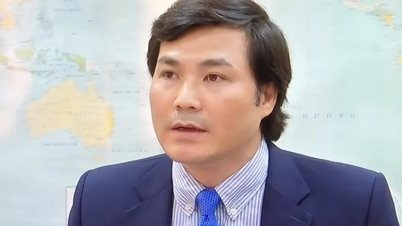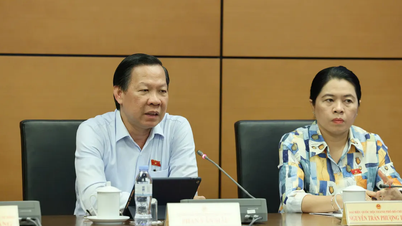Credit in all economic sectors decreased except real estate
Speaking at the Conference on implementing monetary policy management tasks in 2024 on the morning of March 14, Mr. Nguyen Quoc Hung - General Secretary of the Banking Association said that the State Bank has synchronously deployed solutions, implemented monetary policy flexibly, in accordance with the market economy and the direction of the Prime Minister , creating conditions for businesses to access credit capital, supporting economic growth.
As of February 28, 2024, economic credit decreased by 0.72% compared to 2023, of which agriculture decreased by 0.17%, construction industry decreased by 0.13%, trade and services decreased by 0.91%, notably real estate credit increased by 0.23%, consumer loans decreased by 1.77%. It can be seen that most economic sectors decreased except for real estate.
"However, low growth in the first months of the year is a common phenomenon. The average credit growth in the first two months of the year in the period 2013 - 2023 is 0.56%. In 2014 - 2018 and 2024, the credit growth rate in the first two months of the year was negative," he said.

Mr. Nguyen Quoc Hung - General Secretary of the Banking Association spoke at the Conference (Photo: VGP).
Regarding the cause, Mr. Hung pointed out that the capital market is facing many difficulties, leading to pressure on medium and long-term capital, including short-term capital, to switch to bank credit capital, while businesses are struggling to cope with the impact of the Covid-19 pandemic.
The economy with global geopolitical conflicts disrupts the supply chain, orders decrease leading to resource and asset depletion. In addition, the pressure to repay the restructuring debt according to Circular 02 is very high, leading to failure to meet the loan conditions.
Second, the banking industry faces the pressure of existing bad debt in the context of Resolution 42 expiring and the sluggish real estate market, leading to difficulties in handling secured assets and recovering bad debt.
Third, consumer lending by finance companies continues to be difficult as many borrowers intentionally do not repay their debts, and in some cases, they even form debt default groups openly on social networks, leading to credit institutions narrowing the scope and target of lending.
Fourthly, high-tech criminal fraud and money laundering are becoming increasingly bold and sophisticated. Fifthly, the implementation of a number of programs and policies under the direction of the Government and the Prime Minister has encountered many difficulties and obstacles regarding legal regulations related to social housing, and some conditions for home buyers are not suitable to the resources, income sources and debt repayment capacity of customers.
Bank capital is not the main source to help businesses overcome difficulties
Regarding recommendations and proposals, the Banking Association believes that: Bank credit capital is only a supplementary capital, not the main capital to help businesses overcome difficulties and promote economic growth. Therefore, it is necessary for ministries, branches and localities to join hands and overcome difficulties in continuing to support and overcome difficulties for the business community and credit institutions.
On that basis, the Banking Association proposed that the Government direct relevant ministries, branches, and local authorities to coordinate with the banking sector to synchronously deploy solutions to restore the economy and remove difficulties for businesses.
Specifically, trade promotion, VAT refund, and some other programs, while boosting public investment and stimulating consumption.
Next is to remove legal difficulties, especially land, create conditions for new investment enterprises, expand production and business according to schedule, simplify investment processes and administrative procedures, and create favorable conditions for business activities of people and enterprises.
"The Government is requested to allow state-owned banks to increase their charter capital, profits and remaining charters to help credit institutions increase their ability to provide credit to the economy," Mr. Hung said.
He also said that it is necessary to review regulations related to sustainable development of the capital market to amend and supplement them to suit reality and international practices, creating confidence for investors. Consider issuing, amending and supplementing Decree 101 on non-cash payments to accelerate the speed of comprehensive digital transformation of the banking industry.
With the State Bank, he proposed allowing credit institutions to restructure debt, keeping the debt group unchanged with principal debt arising from 2023, extending to December 31, 2024 instead of June 30, 2024 .
Source


![[Photo] Readers line up to visit the photo exhibition and receive a special publication commemorating the 135th birthday of President Ho Chi Minh at Nhan Dan Newspaper](https://vphoto.vietnam.vn/thumb/1200x675/vietnam/resource/IMAGE/2025/5/17/85b3197fc6bd43e6a9ee4db15101005b)



![[Photo] More than 17,000 candidates participate in the 2025 SPT Competency Assessment Test of Hanoi National University of Education](https://vphoto.vietnam.vn/thumb/1200x675/vietnam/resource/IMAGE/2025/5/17/e538d9a1636c407cbb211b314e6303fd)
![[Photo] Prime Minister Pham Minh Chinh chairs meeting on science and technology development](https://vphoto.vietnam.vn/thumb/1200x675/vietnam/resource/IMAGE/2025/5/17/ae80dd74c384439789b12013c738a045)





























![[Photo] Nearly 3,000 students moved by stories about soldiers](https://vphoto.vietnam.vn/thumb/1200x675/vietnam/resource/IMAGE/2025/5/17/21da57c8241e42438b423eaa37215e0e)




































































Comment (0)